#broncho billy
Explore tagged Tumblr posts
Text



Gilbert “Broncho Billy" Anderson (March 21, 1880 – January 20, 1971)
13 notes
·
View notes
Text

Gilbert M. Anderson a.k.a. Broncho Billy Anderson. Head-and-shoulders portrait, facing slightly left. Date circa 1913.
He was an American actor, writer, film director, and film producer, who was the first star of the Western film genre and founder and star for Essanay studios. In 1958, he received a special Academy Award for being a pioneer of the film industry.
8 notes
·
View notes
Text

1915 Marguerite Clayton illustration by Emil Flohri for "Judge" magazine. Marguerite was the leading lady for Broncho Billy Anderson. From Silent Era and Pre-Code Art, FB.
51 notes
·
View notes
Text
Lost, but Not Forgotten: Two Kinds of Women (1922)
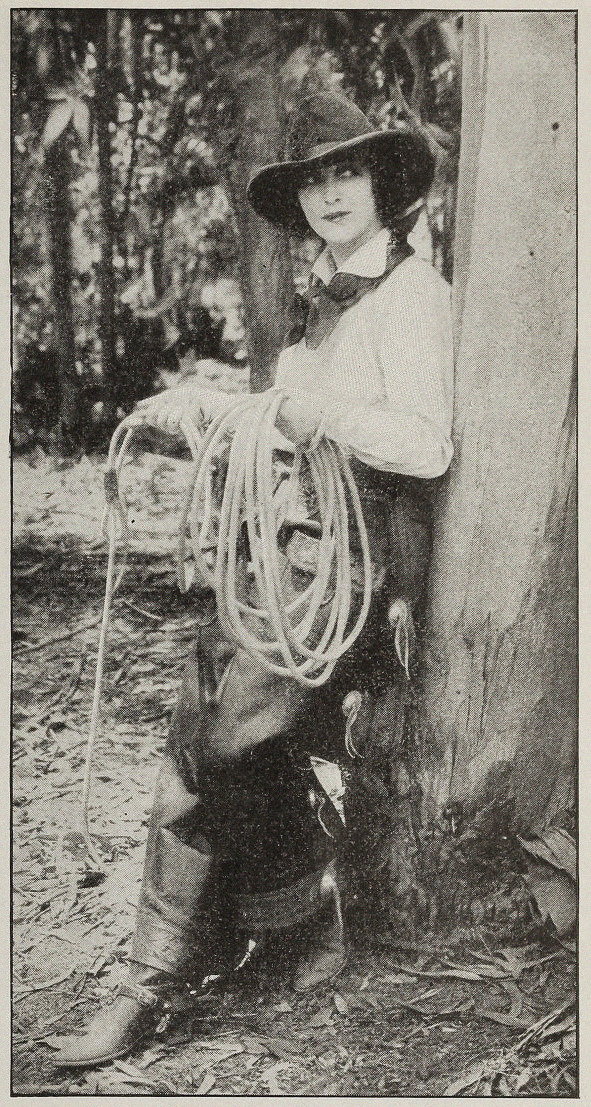
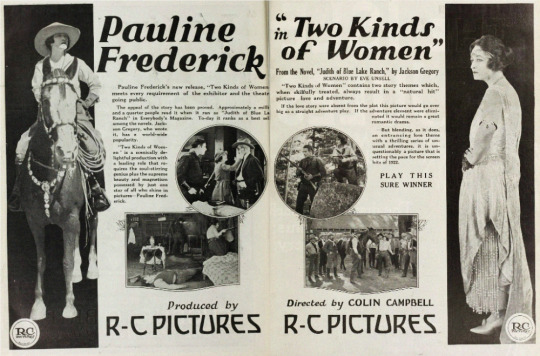
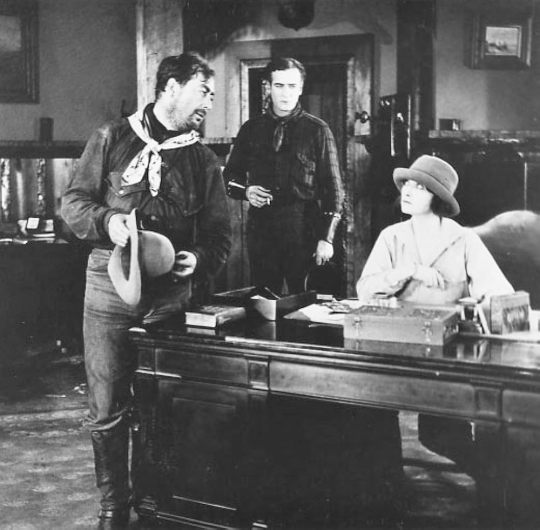
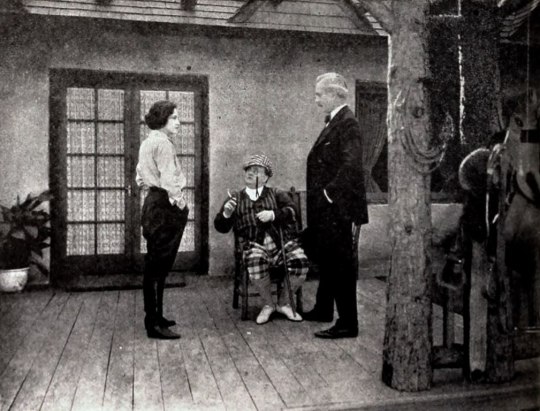
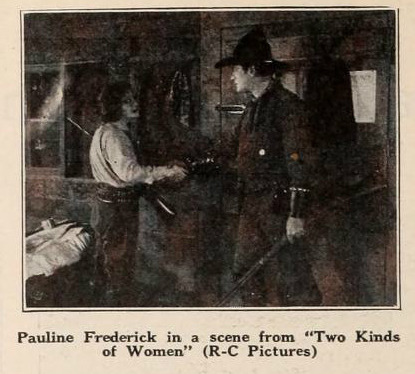
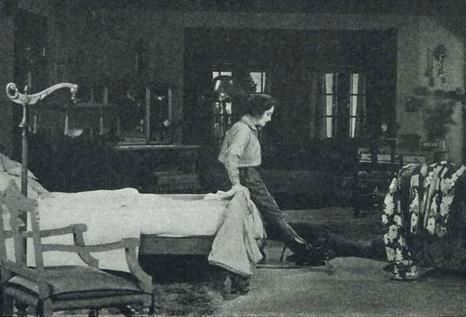
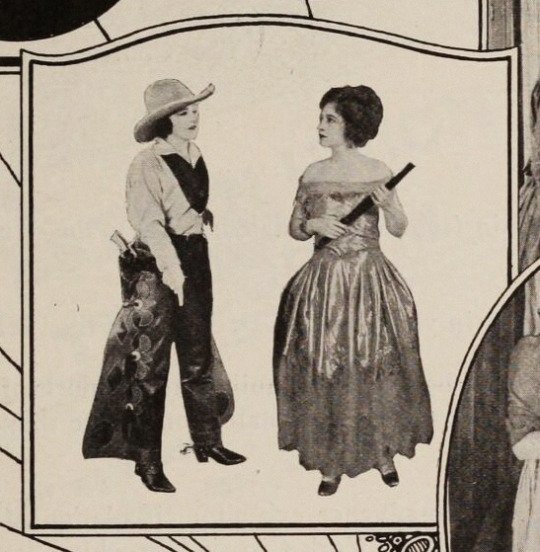
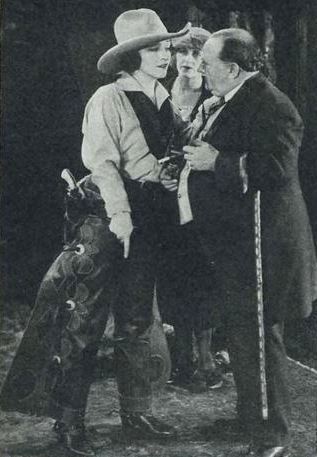
Alternate Title: Judith of Blue Lake Ranch
Direction: Colin Campbell & George C. Bertholon (assistant)
Adapted Scenario: Winifred Dunn
Based on: Judith of Blue Lake Ranch by Jackson Gregory (novel)
Production Manager: R.J. Tobin
Camera: Dev Jennings
Editing: Pauline Frederick (editing supervisor), Colin Campbell, & Dev Jennings
Studio: Robertson-Cole (Production & Distribution)
Performers: Pauline Frederick, Tom Santschi, Charles Clary, Dave Winter, Eugene Pallette, Billy Elmer, Jack Curtis, Jim Barley, Sam Appel, Otis Harlan, Clarissa Selwynne, Jean Calhoun, Tom Bates, Lydia Yeamans Titus, Frank Clark, Bud Sterling, Elise Collins, Joseph Singleton, & Stanhope Wheatcroft (not mentioned after release, but listed during production: L.C. Shumway)
Premiere: Opened at Loew’s State Theatre on 3 February 1922; preview screenings for reviewers in NYC, 27 January
Status: presumed entirely lost
Length: 6 reels, ~6,000 feet (a few sources say 5, most say 6)
Synopsis (synthesized from magazine summaries of the plot):
Judith Sanford (Frederick) inherits the sizable Blue Lake Ranch after the unexpected death of her father. Upon her arrival, she discovers that the ranch’s manager, Trevors (Clary), has been systematically undermining the value of the ranch. Judith confronts him, fires him, and wings him with her pistol as severance.
The horse foreman, Bud Lee (Santschi), had suspected Trevors’ dirty dealing, but questions if he can work for a woman. Regardless of his doubts, Bud respects Judith’s goals and remains loyal to the ranch.
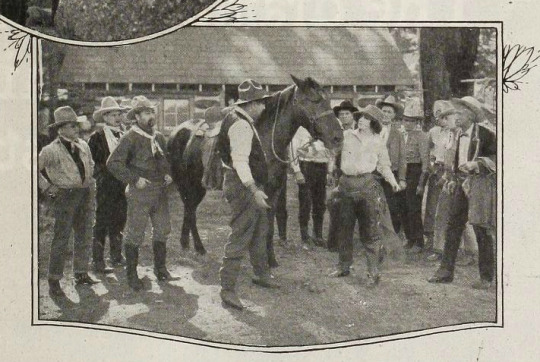
As there are still men working on the ranch loyal to Trevors, Judith’s employees are divided. One of Trevors’ hires, Quinnion (Curtis) rebukes Judith and suggests she can’t even ride. She challenges him to bring her a horse he thinks she can’t ride. Judith successfully rides the wild broncho and Quinnion is cowed, leaving the ranch bitterly. The incident wins Judith the respect of the men, including Bud and Carson (Pallette), the cattle foreman.
Judith’s next point of action is tracking down the staff Trevors ousted, most importantly the ranch vet, Doc Tripp (Clark). Tripp returns and uncovers that disease-infected animals have been intentionally introduced to the ranch’s stock. Judith runs Trevors’ vet, Crowdy (Appel), off the ranch.
Hampton, a city boy and one-third owner of the ranch, is unhappy when he hears of Trevors’ firing and decides to pay a visit to Blue Lake. (In reality, he’s dodging his creditors.) The visiting socialites are rankled by Judith’s cowgirl togs and no-nonsense demeanor. Alternately, the ultra ladylike Marcia (Calhoun), Hampton’s fiancee, finds a new devotee in Bud.
On the night of their arrival, Judith learns that the employee she sent to collect the payroll has been robbed. Bud races to the bank overnight to return to pay the staff the following day. As Bud is on his way back, his horse is shot out from under him, but he manages to reach the ranch just in time.
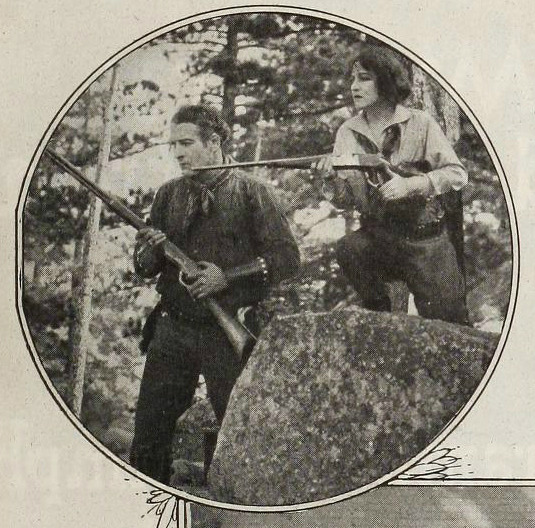
That night, Bud and Judith set out to track down the bandits and recover the stolen payroll. At a cabin in the mountains, they catch the robber after a shootout and find it’s the discharged vet, Crowdy. They agree to stay overnight to guard the injured Crowdy. To pass the time, Judith pulls a book from an unexpectedly well-stocked library in the cabin and sees that the books belong to Bud! They’re interrupted when Quinnion attacks to save Crowdy and another shootout ensues.
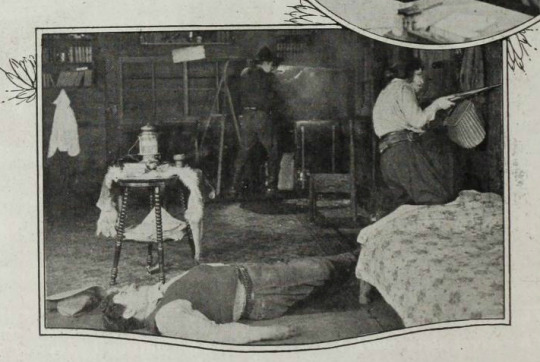
Fortunately, Judith’s absence from the ranch was noticed by Hampton. He has mounted up with Bud’s assistant, Tommy, and they arrive in time to save the pair and manage to capture another of Trevors’ agents, Benny (Barley). Benny is locked up, but is freed overnight, meaning there are still more of Trevors’ men lurking. Bud pledges his loyalty to Judith, but then has a romantic foray with Marcia.
Despite the hubbub, the annual Blue Lake dance is held. Carson kits out the workers in suits mail-ordered from Sears-Roebuck, which they accessorise with guns and ammo belts. Bud, it turns out, has a tailored suit of his own that he unpacks and presses for the occasion. He is bewildered when he arrives at the dance and sees a perfectly feminine Judith in a fashionable Parisian gown. Fully enamored with “the real Judith,” Bud whisks her off to the porch and kisses her.
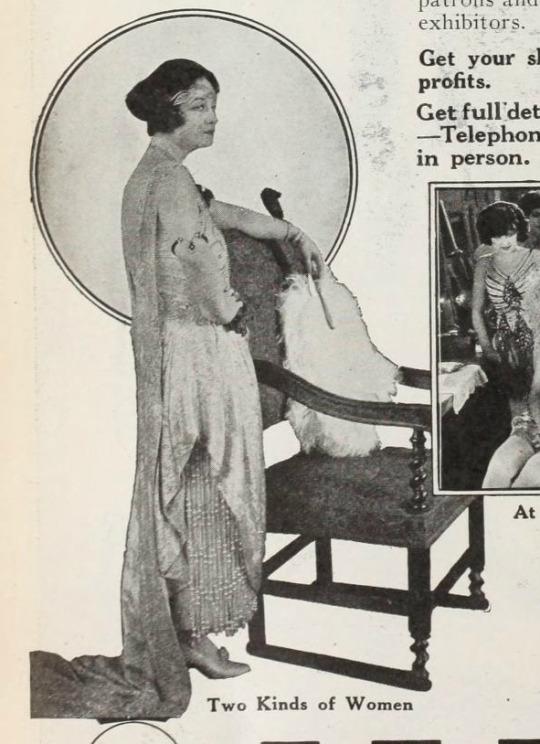
Judith is surprised to find an urgent note from Doc Tripp awaiting her after the dance. The note explains that he has uncovered another Trevors mole and has been wounded. Judith rushes to Tripp, but is waylaid and kidnapped. She manages to remove the mask from one of her abductors and it’s Trevors himself!
Three days pass. Hampton suddenly orders Carson to prepare 500 head of cattle to be sold at a loss. Immediately suspicious, Bud rides to the ranch house and is told that Judith left for San Francisco three days prior. Given Hampton’s fishy assumption of command, Bud and Carson tie him up while they investigate Judith’s real whereabouts. They discover the forged note and confirm with Tripp that he didn’t write it. With mistrust toward Hampton building, they place him under guard and ride to confront Trevors.
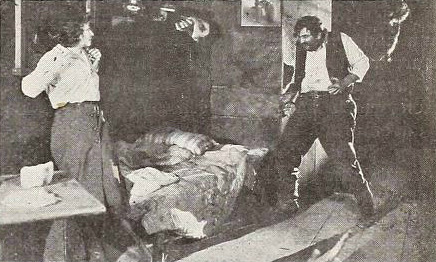
In all that time, Judith has been kept prisoner in the mountains by Quinnion. When Quinnion attacks her, Judith seizes an opportunity to escape, but quickly learns that her prison is set among perilous cliffs. Quinnion gives chase, they struggle, and he plummets to his death. Hopelessly lost and exhausted from her ordeal, Judith makes a last ditch effort for rescue by lighting a signal fire before losing consciousness.
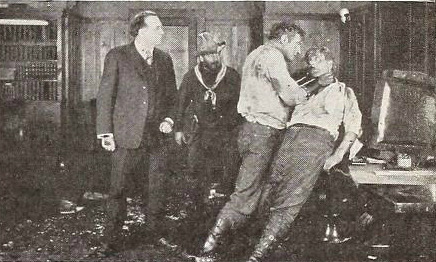
Bud and Carson find Trevors and a wild fist fight breaks out. Bud trounces Trevors and Trevors is forced to leave town for good, but not before revealing where he’s hidden Judith. Bud rescues Judith and they all return to the ranch. After they have had time to recover from their respective tribulations, Bud and Judith reunite and embrace.
——— ——— ———
Points of Interest:
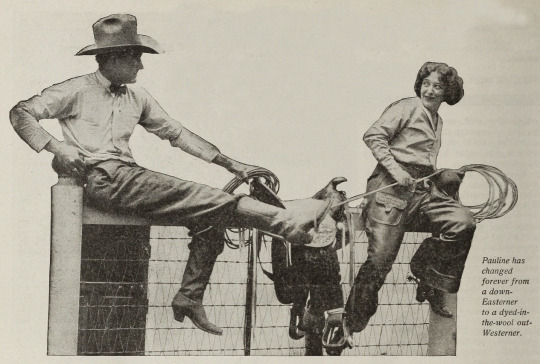
Pauline Frederick made 55 silent feature films in her career. Of those 55 films 45-6 of the films are presumed lost or mostly lost. [One film’s status is unclear ATM.] Of the 9 known to survive, 3 are incomplete (2 are missing at least one reel and the 3rd survives in an abridged cut). Of the surviving 9, three have had home video releases [Three Women (1924), Devil’s Island (1926), and Smouldering Fires (1925)]. Of the 6 surviving films that haven’t had home-video release, 2 have been screened publicly in the past decade [The Love the Lives (1917) and The Moment Before (1916)]. A very rough record for a big star (who didn’t spend most of their career at Fox) to only have a 16-18% survival rate.
——— ——— ———
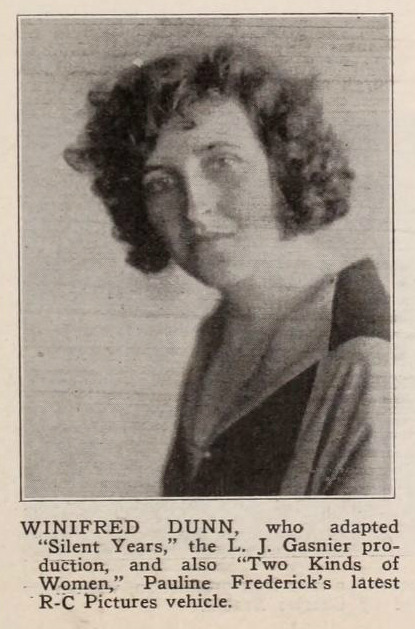
Winifred Dunn, prolific writer from a young age working in many genres, wrote/edited 33 silent features, 20 of which are presumed lost.
——— ——— ———
Two Kinds of Women was part of the schedule of R-C Pictures’ releases for early 1922. This was a crucial moment in the history of the company, as it was soon after re-organized into F.B.O. The founders exited the company, but so did Pauline Frederick, Sessue Hayakawa, Tsuru Aoki, and Doris May—their biggest stars going into 1922.
While the contemporary critical response to TKoW was generally positive and exhibitors across the US and Canada cited good ticket sales, it didn’t leave much of a legacy. At least one contemporary critic, Laurence Reid, considered the film of decent quality but ultimately forgettable. Whether TKoW would have stood the test of time or not, we can’t know. Lost or not, I’m sure the re-organization of TKoW’s distributor affected its potential for long-term popularity. There is at least one instance from after the re-org of a theatre owner receiving a faulty print of the film. So, even by 1923, it was hard to come by a decent print of TKoW.
The reason I’m confident in placing blame on R-C/F.B.O. is that, of the slate of 20 films they released in late 1921 and early 1922, 16 are currently presumed lost and only 3 appear to be completely extant:
Lost: The Lure of Jade, The Sting of the Lash, The Foolish Age, Eden and Return, Five Days to Live, The Vermillion Pencil, A Wife’s Awakening, Silent Years, The Call of Home, The Barricade,Two Kinds of Women, Boy Crazy, Salvage, The Glory of Clementina, Gay and Devilish, and At the Stage Door Extant: Where Lights Are Low, The Swamp (would live to see this one BTW), and Beyond the Rainbow
☕Appreciate my work? Buy me a coffee! ☕
Transcribed Sources & Annotations over on the WMM Blog!
#1920s#1922#Pauline Frederick#film history#Winifred Dunn#western#silent cinema#lost film#silent era#cinema#classic cinema#classic movies#classic film#american film#film#silent film#silent movies#lost media#history#california#old hollywood
19 notes
·
View notes
Text
Today’s 100 year old short is “The Handy Man” released March 12, 1923. Starring Stan Laurel. A typical Laurel short of the time. Directed by Broncho Billy Anderson. A fun performance by Merta Sterling. She appeared in more than 60 films between 1914 and 1927.
The handy man pays ardent attention to the plump cook, who is really the lost wife of a mysterious stranger. He finds out in time to divorce her.
THE FULL FILM
youtube
Get it here
Laurel or Hardy: Early Films of Stan Laurel and Oliver Hardy (Flicker Alley) [Blu-ray] https://a.co/d/h3m9Qn5
#stan laurel#silent comedy#silent film#silent cinema#silent era#silent movies#Youtube#100 years ago#100 years old
3 notes
·
View notes
Text
Working the Land Out West --Threshing Steam
Beckwith OLYMPUS DIGITAL CAMERA Moving West 1879– Lanark County Names Did Farming Pay in 1879? Going West — From Lanark County Names Names Names Lanark County Residents involved in the California Gold Rush OFF TO MANITOBA 1879– Local Lads Names Peter Cram of Beckwith Perth and High Street in Carleton Place Billy the Kidd’s Mistress — Roxy Theatre Time The Truth About Broncho Charlie and…

View On WordPress
#almonte#Carleton-Place#farm equipment#farming#genealogy#History#Lanark-County#Mississippi mills#ontario#out west#steam#steam machines#threshing
0 notes
Text
WESTERN MOOD: Broncho Billy and the Schoolsmistres - Gilbert M. ... https://western-mood.blogspot.com/2012/02/broncho-billy-and-schoolmistress-1912.html?spref=tw

1 note
·
View note
Text
The Broncho Billy Silent Film Fest Returns!
The Broncho Billy Silent Film Fest Returns!
Ten Days From Today! The Niles Essanay Silent Film Museum brings its annual Broncho Billy and Friends Silent Film Festival back to real world 3 dimensional space at its brick and mortar home in in Niles, California. Highlights include films of Broncho Billy and Alkali Ike and other silent westerns, a tribute to the late Baby Peggy, a screening of Buster Keaton’s Seven Chances, a presentation by…
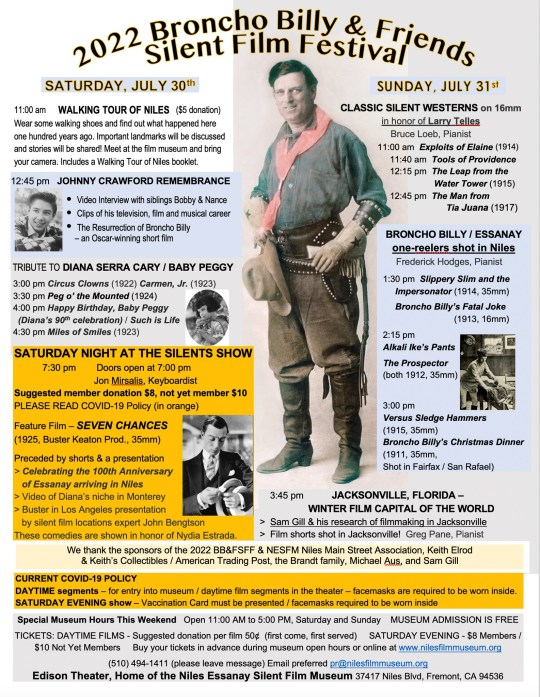
View On WordPress
3 notes
·
View notes
Photo

301. Sua Regeneração (His Regeneration, 1915), dir. Gilbert M. ‘Broncho Billy’ Anderson
#cinema#gilbert m. 'broncho billy' anderson#charles chaplin#american movies#1910s movies#short movie#classic movies#black and white movies#silent movies#crime#drama#comedy#cinema icons#cinefilos
9 notes
·
View notes
Text
The Great Train Robbery's parting shot
The Great Train Robbery’s parting shot
Jean-Luc Godard felt film-makers should be free to rearrange the beginning, middle and end of their scenarios. In 1903, Edwin S Porter left it to the projectionist. Scene 14 of his The Great Train Robbery, according to the sales catalogue, “can be used either to begin the subject or to end it, as the operator may choose”. The Great Train Robbery is one of cinema’s earliest westerns, and something…
View On WordPress
#Broncho Billy#Edwin S Porter#featured#Goodfellas#Justus D Barnes#Martin Scorsese#silent film#The Great Train Robbery#western
2 notes
·
View notes
Photo

A Merry Christmas to you all, from Carlyle Blackwell, Mary Pickford, John Bunny, Lillian Walker, Edwin August, Earle Williams, Marc MacDermott, Alice Joyce, G. M. Anderson, Crane Wilbur, Mabel Trunnelle, Francis Bushman, Beverly Bayne, Warren Kerrigan, Wally Van, Clara Young, Maurice Costello, and from all the other plays (whom Mr. Gallagher could not find room for), and also from the Motion Picture Magazine.
Illustration by Jack Gallagher in Motion Picture Magazine, January 1915. Internet Archive.
#1915#Motion Picture Magazine#Carlyle Blackwell#Mary Pickford#John Bunny#Lillian Walker#Edwin August#Earle Williams#Marc McDermott#Alice Joyce#Broncho Billy Anderson#Crane Wilbur#Mabel Trunnelle#Francis X Bushman#Beverly Bayne#J Warren Kerrigan#Wally Van#Clara Kimball Young#Maurice Costello#Jack Gallagher#illustration#Motion Picture Magazine January 1915#January 1915#Christmas
12 notes
·
View notes
Text



Remembering Broncho Billy Anderson, #botd in 1880
8 notes
·
View notes
Text
Jerry and Severen’s cameos in Anno Dracula
Posting by request from @rock-n-macabre! I’ve never seen anyone on this site mention the Anno Dracula series by Kim Newman, but it’s an AU/spinoff of the original Dracula novel wherein Dracula was not defeated and successfully took over England. It’s an alternate history of real-world events in which vampires live openly, and it’s populated by personages from all manner of vampire media, real history, and classic literature. The list of cameos and references is massive and they range from major characters to hidden Easter eggs.
For us 1980s film vampire fans, here are the relevant excerpts from the chapter featuring my beloved boys Jerry Dandridge of Fright Night and Severen of Near Dark. This is from book two of the series, The Bloody Red Baron, which centers on World War I. In this scene, Allied pilots are launching an attack against a German aerial force of huge shapeshifting vampires.
The pilots for tonight’s jaunt were already in flying kit. Allard had a few veterans of the old Condor Squadron, but most, like Winthrop, were from the new intake. Mainly, they were American vampires, purposeful as blades, solitary as cats.
...
Allard liked to have the patrol line up as if for inspection, and go over the particulars once more. Winthrop fell in by Dandridge, a Yank new to the war but skilled in predation. The elder had passed among the warm for centuries, stalking in the cities of the living. Others of the intake---the cowboy Severen, the insatiable Brandberg, the idealist Knight---were old, turned before the 1880s. Mr. Croft reasoned that those who lived through ages of persecution must have the instinct to kill and survive. There was friction between these elder aces and Cundall’s contemporaries. No arguments, just mutual distaste.
...
Allard favoured a barbed arrow formation: taking the tip position himself, ranks falling back above and below and to both sides. Winthrop kept steady immediately above and behind the flight commander, with the high man, Dandridge, immediately above and behind him.
...
Winthrop watched the flier tumble, wings like an umbrella reversed by a sudden wind. He recovered and cruised downwards. Severen was on the wounded vampire’s tail, whooping and firing like Broncho Billy. The elder had a killing thirst and was ignoring tactics. When his guns were empty, his enemy would recover and come for him.
...
Another burst. Another miss. The bat-creature executed a perfect Immelmann and swooped towards the slice of moon. Dandridge was on his tail, firing scientific bursts. The Boche came out of his turn and spread wings wide. Dandridge had hit him. Red gobbets dripped in black fur.
With a sinking motion, the shape-shifter got beneath Dandridge’s climb and latched like a lamprey on to the underside of the Camel, wings wrapping upwards, tail lashing. The Camel’s frame buckled and its engine stalled. The prop sliced into the Boche’s face but jammed.
Winthrop was appalled.
The Camel came apart. Dandridge’s upper plane ripped off and disappeared like a kite in a storm. The shape-shifter detached from the aircraft. Dandridge’s crushed wreck plunged, wind shrieking in the wires. As he went down, Dandridge emptied his guns.
The creature that had killed Dandridge struggled to stay aloft. He had taken many hits and the propeller slice was severe. His wings were ragged and torn. Ribbons of dark blood flew from wounds.
...
Fourteen had approached the castle. Five were returning.
Winthrop had seen Dandridge and Rutledge killed and known Severen would lose his match. Now, he realised he had for a half-instant glimpsed one of the shape-shifters with a human rag in his mouth, shaking his head as blood-trails whipped. That had been another of the pilots.
The rest had been killed without his even noticing. Nine men exchanged for two monsters. The dog-fight couldn't have lasted more than two or three minutes.
Poor guys had a rough night, but meh, they’ll be fine. (Jerry can turn into a bat; he was probably out of his plane before it hit the ground.) It’s fun to imagine the pair of them as coworkers/war buddies, and even more fun to picture them helping haul each other’s battered asses off the field. (Someone will have to draw that. That someone may even, eventually, be me)
I’m assuming there’s some kind of conscription going on, because I don’t envision Severen volunteering for an outfit that’s all about authority and discipline like the military (we see how well he follows orders). So I love that someone along the line looked at this unhinged, chaotic bastard and decided that what he needed was access to heavy munitions and the power of flight
#Near Dark#Severen#Fright Night#Jerry Dandridge#Anno Dracula#vampires#monsters#war#violence#why this is hell nor am I out of it
17 notes
·
View notes
Text
I was reading more of Stoker’s short stories last night and I think it’s Important to Note, at this moment in history, that this is how Stoker writes American accents, or least the accent of one “ Elias P. Hutcheson, hailing from Isthmian City, Bleeding Gulch, Maple Tree County, Neb. “ (warning if you go read it that there’s a lot of racism in this story, I really don’t recommend it )
“Guess, ma’am, nothin’s too terrible to the explorin’ mind. I’ve been in some queer places in my time. Spent a night inside a dead horse while a prairie fire swept over me in Montana Territory—an’ another time slept inside a dead buffler... I’ve been two days in a caved-in tunnel in the Billy Broncho gold mine in New Mexico, an’ was one of the four shut up for three parts of a day in the caisson what slid over on her side when we was settin’ the foundations of the Buffalo Bridge. I’ve not funked an odd experience yet, an’ I don’t propose to begin now!”
“Wall!” he said, “I guess I’ve not had enjoyment like this since I left Noo York. Bar a scrap with a French sailor at Wapping—an’ that warn’t much of a picnic neither—I’ve not had a show fur real pleasure in this dod-rotted Continent, where there ain’t no b’ars nor no Injuns, an’ wheer nary man goes heeled. Slow there, Judge! Don’t you rush this business! I want a show for my money this game—I du!”
“ Jest give her a shove off if she comes any of her tricks on me, for I’m so fixed everlastingly by the boss, that durn my skin if I can keep my eyes from her if she wants them! Easy there, Judge! don’t you slack that ar rope or I’m euchered!”
I can’t remember him doing anything quite like this in Dracula but I guess I’ll find out ?!?
21 notes
·
View notes
Text
12 Christmas Films of a Century Past
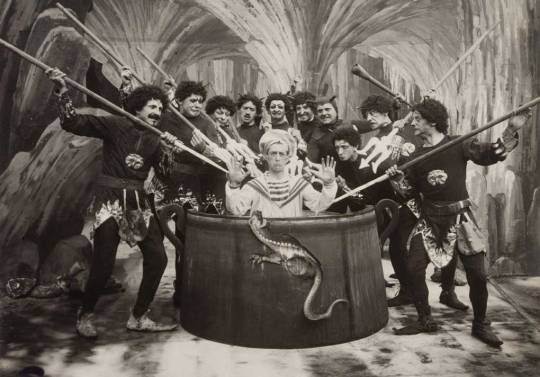
For some reason, I thought it would be a good idea to watch somewhere around 50 Christmas and Christmas-adjacent silent films from before 1920 to put together a playlist for you all. So, I hope you enjoy!
I chose these twelve as a representative selection. My general criteria were:
Christmas should be central to the story
The plot should be novel to a modern viewer or something a modern viewer would be surprised to see so early on film
The list on the whole should have a variety of settings and narrative structures
Here’s a direct link to the YouTube playlist if you want to watch them all in one go. (They are all shorter than feature length!)
Two quick presentation notes: 1. Some of the videos have music and some don’t, so you may want to check your volume level. 2. The intertitles for some of these films are not in English, so be sure you have captions turned on for English translations.
See the whole list BELOW THE JUMP!
1. Santa Claus (1898) (UK)
Directed by George Albert Smith
Short and sweet, this film sees children put to bed by their nanny on Christmas Eve and Santa Claus coming down the chimbley to fill their dutifully hung stockings. Director G.A. Smith used his own patented technique of double exposure to show Santa’s arrival without cutting away from the children’s room. Santa Claus might not pack the punch of a Méliès trick film, but it’s a fun novelty and is purportedly the first appearance of Santa Claus on film.
2. The Little Match Seller (1902) (UK)
Directed by James Williamson
This one’s quick but effective adaptation of the Hans Christian Anderson tragedy featuring impressively well-coordinated superimpositions.
3. The Christmas Angel (1904) (FR)
Directed by George Méliès for Star Film Company
The Christmas Angel follows an impoverished girl driven into the city to beg on a snowy winter night. First she’s chased away from a church by more seasoned beggars; then she’s thrown out of a poultry seller and harassed by police. On the verge of falling asleep in the snow, a rag-and-bone man rouses her and offers her help. Later, the girl passes out beside a road but is luckily spotted by a wealthy couple on a car ride. When they learn of her plight, they bring her home along with food and gifts.
Though not as fantastical as some of Méliès’ more famous works, The Christmas Angel is still highly stylized (and stylish) and features special effects that photograph beautifully. It’s also worth noting that the version of the film included here is the American cut. The original French cut, titled Détresse et Charité (Distress and Charity), did not include the sequence with the wealthy couple and instead ends with the girl dying in the snow.
4. The Night Before Christmas (1905) (US)
Directed by Edwin S. Porter for Edison Manufacturing Company
This is the first time the poem “Twas the Night Before Christmas” was put on film. Loosely following the poem, we see Santa Claus prepare for his yearly trek while a middle-class family prepares for his visit. When Santa heads out, we are treated to an extended panning sequence with a fully painted backdrop for a mini Santa and his reindeer to glide across. When Santa arrives at the family home, he chaotically dumps presents and decorations around their living room and makes a large, decorated tree appear out of thin air. (Across many of the movies I watched to put this post together, this seems to be a favored scenario for the jolly fat man around this time–and it’s delightful.) The family then wakes to find their gifts and the film closes with Santa directly wishing us a Merry Christmas.
5. A Little Girl Who Did Not Believe in Santa Claus (1907) (US)
Directed by J. Searle Dawley and Edwin S. Porter for Edison Manufacturing Company
Even at the risk of this list being too Edison heavy, I couldn’t leave this great short out. While walking with his mother, a rich little boy encounters a poor little girl alone in the cold. They take her home to play and warm up. When the boy learns that the girl doesn’t believe in Santa because apparently Santa doesn’t visit poor children, he hatches a scheme. On Christmas Eve, the boy has a stake out near the fireplace and takes Santa hostage, tying him up and holding him at gunpoint. The boy then forces Santa to visit the girl–going so far as shimmying down the chimney himself to let Santa in the front door. When the girl wakes up to a beautifully decorated tree, new toys, and a full stocking, she can finally believe in Santa Claus. While I’m generally not so into stories about supposedly benevolent rich people, I do love the implications this story has on how Santa Claus works and I also find the means with which the boy gets his way hilarious.
6. Il Natale di Cretinetti / Foolshead’s Christmas (1909) (IT)
and Come fu che l’ingordigia rovino il Natale di Cretinetti / How Greediness Spoilt Foolshead’s Christmas (1910)
and Il Natale di Cretinetti (1911)
Directed by Andre Deed for Itala Film
This entry is a three-for, which I hope you’ll excuse, but I couldn’t decide which Cretinetti Christmas to share! Cretinetti, the comedic persona of filmmaker Andre Deed, is an absolute agent of chaos.
In the 1909 film, Cretinetti attempts to bring a tree home for a Christmas party. The destruction escalates wildly, culminating in an entire building falling to pieces.
If you can believe it, the stakes are even higher in the 1910 film, when Cretinetti can’t resist sneaking out of bed on Christmas Eve to snack on the candy decorating the tree. When Santa sees what Cretinetti has done, he chides him and takes him back to his workshop, which is apparently in heaven. Destruction ensues. Cretinetti then proceeds to cause havoc for Saint Peter, annoying god so much that he calls the devil to come get Cretinetti. Cretinetti is then chased to hell where demons try to cook him alive. Thankfully, spoiler alert, it was all a bad dream and he wakes up on Christmas morning with a terrible stomach ache.
The 1911 film returns to localized chaos. Cretinetti has a run-in with a mail carrier and his Christmas packages get mixed up with one of the carrier’s parcels. The parcel contains three bottles of ether which then begin to emit gasses in the middle of the family Christmas party.
I wasn’t familiar with Cretinetti before reviewing films for this list, but I’m definitely going to seek out more of Deed’s movies. Each of these films had well-executed chaotic slapstick; over-the-top in all the right ways.
7. Making Christmas Crackers (1910) (UK)
Produced by Cricks & Martin Films for Clarke, Nickolls, & Coombs Confectionery
To start, if you’re not sure what a Christmas cracker is, it’s a colorfully decorated paper tube that makes a cracking noise as you pull it open. Inside the tube is a paper hat, a joke, and/or a small toy. It’s a traditional part of UK Christmas celebrations.
This short starts as a documentary of the workers at Clarke, Nickolls, & Coombs constructing the crackers. It’s a fun thought that as early as 1910, people were interested in watching how mass-produced consumer goods were made. It’s also fun to see these skilled workers ply their trade so deftly (even though I’m sure wages and working conditions were less than ideal). The film ends with a family celebrating around a Christmas tree topped with a functional giant cracker.
8. A Christmas Carol (1910) (US)
Directed by J. Searle Dawley for Edison Films Manufacturing Company
There are so so so many film adaptations of Charles Dickens’ A Christmas Carol made before 1920 that it was hard to choose which one to include on this list. In the end I chose this 1910 version for its economy of storytelling, fluid use of special effects, and for Marc McDermott’s great performance as Scrooge.
9. Broncho Billy’s Christmas Dinner (1911) (US)
Directed by Gilbert M. Anderson (Broncho Billy) for The Essanay Film Manufacturing Company
Gilbert M. Anderson was an incredibly prolific and popular filmmaker and star of early American film, particularly in his role as Broncho Billy. As was typical for Anderson, he’s pulling triple duty on Broncho Billy’s Christmas Dinner as the star, director, and producer. The film features a simple and heartwarming story.
On Christmas, Billy comes across a young woman in peril as her horses got startled and are now pulling her cart along wildly. Billy manages to wrangle the horses and in gratitude she invites him to Christmas dinner at her parents’ home. Unfortunately, her father happens to be the sheriff. But, all is well, as it turns out that Broncho Billy’s been given a pardon and the sheriff welcomes him to the table gladly.
The enduring appeal of outlaws or criminals getting into the Christmas spirit is fascinating to me and it’s cool to see such an early instance of the story!
10. Le Noel de la princesse / The Little Princess’s XMas Gift (1911) (FR)
Produced by Société Générale des Cinématographes Éclipse
In all honesty, this is the least Christmassy of all the films I included here, but its style and novelty stood out. The sets, costuming, and production design are lush. It might also be one of the weirdest Christmas stories I’ve even encountered.
After Lord Othberg passes away, the conniving Otto plans to assassinate the baby prince in order to inherit the lordship himself. He poisons the baby, but the princess prays for her baby brother to come back to life as her Christmas gift. An angel appears to her and they summon Jesus, who resurrects her baby brother. Of course, they then place the revivified baby in the castle’s nativity scene, to the joy of all but Otto.
11. Ida’s Christmas (1912) (US)
Directed by Van Dyke Brooke for Vitagraph Company of America
With a more classic Christmassy story, Ida’s Christmas tells us of a family who are facing hard times. Ida (played by a very small Dolores Costello) has her eyes on a pricey doll. Meanwhile, her mother seeks out employment with a wealthy family. The matriarch of the wealthy family overhears Ida’s wish and decides to buy the doll for her as a surprise. Later, Ida is distraught to find that the doll has been purchased but comes across a wallet that someone has dropped. She considers taking the money, but chases down the owner instead. The old man gives her some reward money for returning the wallet. Ida rushes to see if she can buy the doll, but has second thoughts when she thinks about how much her family could use the money. She arrives home with the money just in time for a Santa-esque old man to show up bearing packages and an assurance that the wealthy family has work for her father. The film ends with the family celebrating an unexpectedly Merry Christmas.
It’s a sweet story that hits so many beats of what we now consider traditional Christmas tales.
12. Rozhdestvo obitateley lesa / The Insect’s Christmas (1913) (RU)
Directed by Władysław Starewicz for Khanzhonkov
Fair warning, if you thought The Princess’s XMas Gift was odd, you might need to ready yourself for this one. Stop-motion virtuoso Władysław Starewicz (Ladislas Starevich) spins a tale about a tiny ornament of Santa/Ded Moroz coming to life on Christmas and going out into the wild to bring Christmas joy to creatures small and smaller, including a frog and a ladybug. Starewicz’s animation is as impeccable as ever and the short is imaginative and quirky.
#christmas#christmas movies#silents#silent film#silent era#silent comedy#1890s#1900s#1910s#Edison#george melies#edwin s porter#broncho billy#cretinetti#andre deed#Italian Film#French film#British film#early american film#american film#Russian film#władysław starewicz#stop-motion#animation#dolores costello#special effects#film history#essanay#vitagraph#star film
75 notes
·
View notes
Text
these anons have been sitting in my inbox for a couple days now , and they’re all too short to do on their own so i thought i’d make a little headcanon dump for yall <3 also , welcome 🐌 anon , glad to have u here bby . xoxoxo , starlight

yes 100% , and hi 🧿anon ! here they are :,)
dream : drunk face (mgk) , love me (the 1975) , runaway (6vib3z) , fool (cavetown) , hey there delilah (plain white ts) , godless (banks)
gogs : coney island (seb) , haircuT (coleton rubin) , happy endings (mike shinoda) , love lockdown (glass animals) , fools gold (jack river)
sapnap : paradise (big sean) , bleach on the rocks (john harvie) , hang me up to dry (cold war kids) , better than me (q money)
karl : figure it out (blu detiger) , haunted (the band camino) , mirrored sea (passion pit) , super sad songs (zachary knowles) , hangover cure (mgk)
quackity : sos (sueco) , can i kick it ? (a tribe called quest) , fantasy boys (broncho) , cardiac arrest (bad suns) , imported (jessie reyes and 6lack)
ranboo : high tops stripped (del water gap) , vienna (billy joel) , new york i love you but youre bringing me down (lcd soundsystem) , flannel (the cardboard swords) , tell me its okay (gnash)
tommy : why did you run (judah and the lion) , out of order (michl) , blur (mo , ft foster the people) , dress up (the regrettes) , wish (diplo ft trippie red) , clear (pusher and mothica , shawn wasabi remix)
tubbo : first day of my life (gnash) , waste my time (kerri) , edge of town (middle kids) , the kids dont wanna come home (declan mckenna) , caught up (lazy weekends)

dream
big hands go brrr
laces his fingers through yours habitually
its second nature for him now
loves comparing hand sizes smh
curls his fingertips over yours and makes fun of your small hands
george :
puts your hand palm up and traces all the lines on it
draws absentminded patterns and shapes on your hands
interlocks his fingers with yours and squeezes your hand as a little gesture of affection
ceo of the thumb thing
sapnap :
hands hands hands
hand k!nk aside , nick LOVES to hold yours
theres something so sweet and gentle about it to him
laces his fingers through yours for sure
making sure his hand is on top
karl :
he <3
holds your hand in every way possible
clasps , fingers threaded together , holding pinkies
loves playing with your fingers when he’s bored
spins any rings you have on
squeezes your hand 3 times for ‘i love you’
quackity :
always has cold hands
so is constantly reaching for yours
again , he does the thumb thing all the time
swings your arms when you’re in public like a lil kid
is always messing w/ your ring finger
“gonna be a real pretty diamond on there some day”

dream :
would be confused at first
but would feel so protected / comforted ?
it would lowkey melt him
and he’d bring his hand up to cover yours as he relaxed
george :
loves when you do this
especially if your squishing his cheeks with both hands
he scrunches his nose and pulls a face
then does the dame thing right back to you
“squishy . squishy baby .”
sapnap :
is so lost lmao
“what are you doing ?”
“nick , im trying to be cute .”
“you’re cute always . get off me .”
but does it to you later that day
he just wanted to be the one holding you :,)
karl :
this is one of his favorite things ever
leans into your palm and shuts his eyes
would sit like this for hours
and gets so sad when you pull away
quackity :
big q my beloved
melts into your touch immediately
and his whole body seems to relax
you run a thumb along his cheekbone and he’s GONE
presses soft kisses to the heel of your hand
#dream#dreamwastaken#dream was taken#dream smp#dream x reader#dreamwastaken x reader#georgenotfound#george not found#george#georgenotfound x reader#george not found x reader#404blr#sapnap#sap nap#sapnap x reader#sap nap x reader#pandasblr#karl#karl jacobs#karljacobs#karl jacobs x reader#karljacobs x reader#honkblr#quackity#alexquackity#alex quackity#quackity x reader#ranboo#ran boo#tommyinnit
97 notes
·
View notes